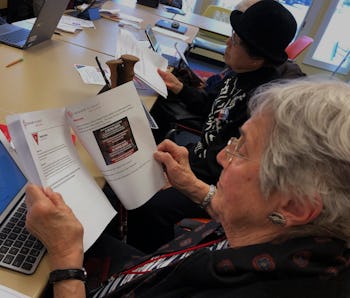Culture
People over 65 share fake news articles seven times more than younger people
We need more classes to teach digital literacy.

Misinformation runs rampant on the internet in 2020. Big tech companies are attempting to keep up by banning deepfakes and labeling fake news, but the only way to really curb the spread of misinformation is to teach people how to spot it. And those who have the most to learn on that front are over the age of 65.
A recent study from researchers at Princeton and New York University found that Facebook users 65 and over posted seven times as many fake news articles as those under 29 years old. While researchers haven’t made any conclusions about why this might be, they hypothesize it boils down to growing up with the internet.
Digital natives are at an advantage — People who grew up with the internet — such as Gen Z and Millennials — know how to navigate the internet with much more ease than older generations. One researcher compares it to seeing a tabloid at the supermarket: an older person would probably recognize the tabloid’s news as mostly rumor, but the same cues aren’t as readily apparent online.
But digital literacy can be taught — All hope is not lost. Classes already exist for older people to learn about how to decipher the differences between real and fake news, like those offered by nonprofit Senior Planet. This might seem trite to younger generations — who needs to take an entire course on internet news? — but it’s a valuable resource for those who didn’t grow up with the internet.
These classes need to be offered more widely — The internet has become a minefield of news: you never know when you’ll trip over something harmful. And this trend is sure to continue. Though internet-navigation classes are available in some places, they’re not yet standard. We can only hope that changes soon.
Maybe Facebook should offer some itself if the company actually wants to make a difference when it comes to misinformation. But I won’t be holding my breath for that.